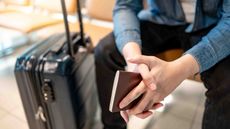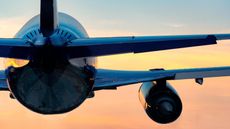9 Ways to Avoid Airline Fees
Follow these tips so that you don't pay extra the next time you fly.
- (opens in new tab)
- (opens in new tab)
- (opens in new tab)
- Newsletter sign up Newsletter

For cost-conscious travelers, getting a good deal on a flight doesn't stop at the price of a ticket. The savings you score by booking the cheapest flight could easily be wiped out by fees that you might be hit with when you fly.
Unfortunately, keeping track of all the things airlines charge extra for and how much they charge is no easy task. That's because airline fees are constantly changing. Since January 2012, airlines have changed 52 fees, according to a study by TravelNerd (opens in new tab), a Web site that helps consumers compare airline fees. More than half of the changes were related to baggage fees. The rest were related to service fees, such as charges for priority seating and ticket changes, and in-flight fees for food, beverages, unaccompanied minors, blankets and other items.
Low-cost carriers Spirit Airlines and Allegiant Air were responsible for 18 of the 52 fee changes, according to the study. For example, Spirit increased its fee for carry-on bags to as much as $100 for some customers (see $100 for a Carry-on Bag -- Ouch!).

Sign up for Kiplinger’s Free E-Newsletters
Profit and prosper with the best of expert advice on investing, taxes, retirement, personal finance and more - straight to your e-mail.
Profit and prosper with the best of expert advice - straight to your e-mail.
Despite the fact that Spirt more than doubled its carry-on fee, most fee increases were $5 to $10, according to TravelNerd. However, TravelNerd Vice President Alicia Jao says some troubling trends have emerged: an increase in fee ranges rather than fixed fees and bundling of services for a single fee. These trends, she says, have lead to less transparency and have made it more difficult to compare prices and services.
Luckily, there are ways to avoid fees. Jao offers these tips:
1. Do your homework. The best way to avoid fees, she says, is to be aware of what airlines charge for and how much. TravelNerd has up-to-date lists of airline fees (opens in new tab). Airfarewatchdog.com also recently published an airline fees guide (opens in new tab). Travelers also can visit airlines' Web sites to research their fees. Jao warns, though, that fees often are listed on various pages, so you need to research each site thoroughly.
2. Fly Southwest or JetBlue to avoid baggage fees. JetBlue allows passengers to check one bag for free; Southwest lets passengers check two bags at no charge. The other major airlines charge $20 and up for checked bags.
3. Measure and weigh your bags. If you must fly on an airline that charges a baggage fee, make sure that you don't pay more than you have to. This means making sure your bag meets the airline's size and weight requirements so that you don't get hit with hefty fees (typically $75 to $100) for overweight and oversized luggage.
4. Take advantage of extra items that can be carried on. If the bags you plan to check are at the weight and size limit, you may be able to carry extra items onto the plane. Each airline has a list of items that you are allowed to carry onto the aircraft separately or in addition to your carry-on bag and personal item. The list varies, but you are typically allowed to carry crutches or walking aids, reading material, a bag of food, umbrellas and coats. So if you are in a bind, take these items out of your bags and carry them onto the plane separately.
5. Be careful with your carry-on. Airlines have even started charging for carry-on bags checked at the gate because they didn't meet size and weight restrictions. Not all airlines charge this fee, though. TravelNerd has a carry-on luggage size chart (opens in new tab) that can help you identify which airlines will charge you if you have to check a bag at the gate.
6. Book early. Airlines are reserving more and more seats for frequent flyers and passengers willing to pay seating fees. By booking well in advance of your travel date, you're more likely to get a good seat from the pool of seats that don't require a fee.
7. Book online because some airlines charge anywhere from $15 to $45 more for tickets booked over the phone.
8. Book through an airline's site because some charge an extra fee if you change a ticket that was booked through a third party, such as a travel agents and travel sites. For example, United, Frontier and Delta have ticket change agency fees, ranging from $25 to $50 (Delta waives the fee if the change is made online).
9. Be certain about your travel plans. Jao says that some airlines charge $150 to change a ticket, so it pays to be sure about your travel plans before you book. Southwest still gives credit and does not charge a ticket change fee, but the airline did announce that it will start charging a fee for no-shows.
Follow me on Twitter (opens in new tab)

Award-winning journalist, speaker, family finance expert, and author of Mom and Dad, We Need to Talk.
Cameron Huddleston wrote the daily "Kip Tips" column for Kiplinger.com. She joined Kiplinger in 2001 after graduating from American University with an MA in economic journalism.
-
-
 Longevity: The Retirement Problem No One Is Discussing
Longevity: The Retirement Problem No One Is DiscussingMany people saving for retirement fail to take into account how living longer will affect how much they’ll need once they stop working. What should they do?
By Brian Skrobonja, Chartered Financial Consultant (ChFC®) • Published
-
 Capital Gains Taxes Trap: How to Avoid Mutual Fund Tax Bombs
Capital Gains Taxes Trap: How to Avoid Mutual Fund Tax BombsIt’s bad enough when your mutual fund’s assets lose value, but owing unexpected capital gains taxes after those losses is doubly frustrating.
By Samuel V. Gaeta, CFP® • Published
-
 The Best Places to Visit Where the Dollar is Strong
The Best Places to Visit Where the Dollar is StrongFrom the Americas and Europe to Africa and Asia, we list the 10 best places to travel to where the U.S. dollar is the strongest.
By Quincy Williamson • Published
-
 How to Make The Most of a Travel Insurance Claim
How to Make The Most of a Travel Insurance ClaimMore travelers are buying insurance. If your trip is canceled, take these steps to increase your chances of recovery.
By Susan J. Wells • Last updated
-
 Great Deals on Family Friendly Trips
Great Deals on Family Friendly TripsTravel From camping excursions to cruises to tropical adventures, these vacation ideas are perfect for the entire family—or a special treat for just you and the grandkids.
By Emma Patch • Published
-
 Despite Cancelled Flights and Short-Staffed Hotels, Americans Are (Sort of) Traveling Again
Despite Cancelled Flights and Short-Staffed Hotels, Americans Are (Sort of) Traveling AgainBusiness Travel Thanks to high gas prices, cancelled flights and labor shortages across the sector, the post-COVID travel recovery looks uneven.
By Sean Lengell • Published
-
 How to Appeal an Unexpected Medical Bill
How to Appeal an Unexpected Medical Billhealth insurance You may receive a bill because your insurance company denied a claim—but that doesn’t mean you have to pay it.
By Rivan V. Stinson • Published
-
 Amazon Prime Fees Are Rising. Here’s How to Cancel Your Amazon Prime Membership
Amazon Prime Fees Are Rising. Here’s How to Cancel Your Amazon Prime MembershipAmazon Prime Amazon Prime will soon cost $139 a year, $180 for those who pay monthly. If you’re a subscriber, maybe it’s time to rethink your relationship. Here’s a step-by-step guide to canceling Prime.
By Bob Niedt • Last updated
-
 13 Money-Saving Travel Tips for Retirees
13 Money-Saving Travel Tips for Retireestravel Globetrotting in your golden years doesn't have to cost a fortune. Here are some ways to cut down on your travel expenses.
By Jackie Stewart • Published
-
 Alpine Skier Takes a Third Run at the Winter Olympics
Alpine Skier Takes a Third Run at the Winter OlympicsTravel This downhill racer has been on the U.S. ski team since he was 19.
By Emma Patch • Published









